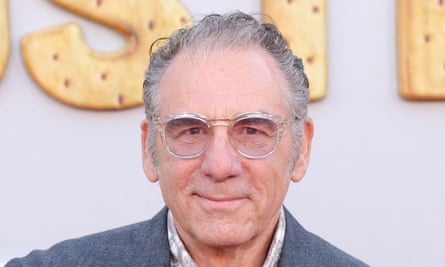From racist rants to spiritual guru? What we learned from Seinfeld star Michael Richards’s autobiography
For the rest of time, Michael Richards will be known for only two things. One of them is Seinfeld, on which he played Kramer; the other is the notorious 2006 Laugh Factory standup set that ended with him screaming racial abuse at a Black audience member.
Richards has just published his memoir, Entrances and Exits, and both of those things feature, albeit one more prominently than the other. The bulk of the book concerns his time on Seinfeld – celebrity anecdotes, the craft of building Kramer from a two-dimensional bit part into a fully formed character, his determination to be paid $1m an episode – with the uglier stuff hurriedly squished into the end. Look around those, though, and a slightly more complicated picture emerges. Here’s the book, abridged.
Richards was the result of a sexual assault
Early in the book, we hear a little of his childhood. At one point his mother tells him that his father died in the second world war. Then, later, that he was killed in a traffic accident in Arizona. He grills her on the inconsistency, and she locks herself in a bathroom. Later, she calls her brother to try to explain things, and he unhelpfully rewards Richards’s curiosity by punching him in the face. Eventually, she explains the dark truth: she doesn’t know who his father is, because he was a stranger who forced himself on her in 1948. “Now I know as much as I need to know about my father,” he writes.
He likes to describe his dreams
Richards details several in the book, but the key one appears to be this, which happened when he was wrestling with the idea of moving to LA to pursue comedy: “In it, I see a clown holding the globe of the Earth, and the face of the clown is my own.” He is the clown, and he can only hold the world by being “the Fool, the ha-ha soul, the clown at large”.
He is especially fond of the time he wore a robe to a corporate event
Ahead of an important NBC bash in 1994, Richards became so incensed that the hotel he was staying at hadn’t cleaned his tuxedo on time that he decided to wear a white hotel dressing gown there instead. It made people laugh, which spurred Richards on to describe the moment thus: “I call this a divine inspiration, the kavorka luring the animal that I am into the cosmos … I feel the holy, the holy is everywhere. Symbolically, it is the dove upon the Christos, the calling of Muhammad, the Shekinah of the prophets, what gives them the ultimate direction. It’s the Greek Dionysus of theatre, the entrances and exits of us all. It’s India’s Ātman, Buddha’s mindfulness, China’s Tao, the great Siberian spirit in Russia.” To reiterate, he wore a dressing gown to a dinner.

He suspects that Larry David inspired one of the most famous Seinfeld bit parts
The first time Richards saw Larry David perform, he was taken aback by how crotchety David was, especially when he pulled his then-signature move of glancing around at the crowd, noticing something that displeased him, muttering “fuck it” and leaving the stage mid-set. “Larry told me later that he didn’t like the way the audience felt,” Richards writes. “He’s like the Soup Nazi. If he doesn’t like the audience, ‘No comedy for you!’”
He didn’t like The Michael Richards Show either
After Seinfeld ended, Richards passed on playing the lead in Monk, and this caused him to enter into one of TV’s great disasters. The Michael Richards Show was a short-lived 2000 sitcom where Richard played an inept private detective. It was almost universally hated, and caused Richards to let anger get the better of him (not for the first time) during a meeting with the writers. “It’s not funny! I’m not funny! I’m dead here!” he screams, before an executive does the decent thing and pulls the plug for good.
after newsletter promotion
He immediately regretted the Laugh Factory incident
In his description of events, Richards’s judgment is clouded by hunger, the weight of his failed sitcom and a restless audience that verbally tells him he isn’t funny. In the moment, “I’m unleashed. I’ve been here before. It’s outrageous! Irrational! Part of the Fool’s kit. Let’s go wild!” He immediately realises that he has overstepped the mark, as illustrated when one audience member approaches him for an autograph and is angrily pulled away by another. Then video emerges and – despite the help of his friend Jerry Seinfeld, who books him on to David Letterman’s show for some immediate damage limitation – his career is functionally over.
But the incident will still inform how you read the book
The Laugh Factory set hangs so heavily over Entrances and Exits that it’s hard not to see parts of it as an attempt to prove that he isn’t as racist as he seemed 18 years ago. One chapter, set during Richards’s time in the army, makes an enormous meal of his friendship with a Black soldier named Howard, who used to be a pimp. Similarly, during the height of Seinfeld, he fell in love with a house, and pointedly remarks that it was designed by Paul R Williams, the first African American architect to work in Los Angeles. “He’s quite important,” Richards writes.
This book was almost much longer
After the Laugh Factory incident, Richards spent years submerging himself in spirituality to conquer the anger issues that ended his career. He gets in pretty deep – on one page, illustrated by a picture of an exploding star, he tries to explain what a soul is, writing that: “With the Earth, I can call her Mother, but this planet is an electromagnetic male (+) and female (-). Made in the image of this, embodying polarity, I must be androgynous.” Indeed, in the acknowledgments, he states that: “The first draft of this manuscript was well over 600 pages. It included a 72-page appendix going much deeper into a spiritual ethos that I live by.” Forget Jerry Seinfeld, perhaps the real hero of this story is the poor editor put in charge of the book.
Entrances and Exits is out now published by Permuted Press (£25).
Source: theguardian.com


